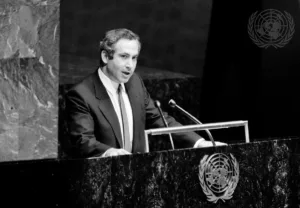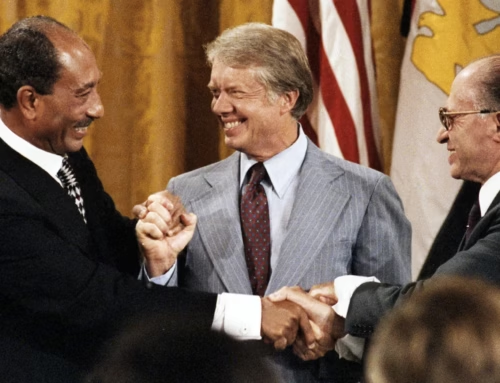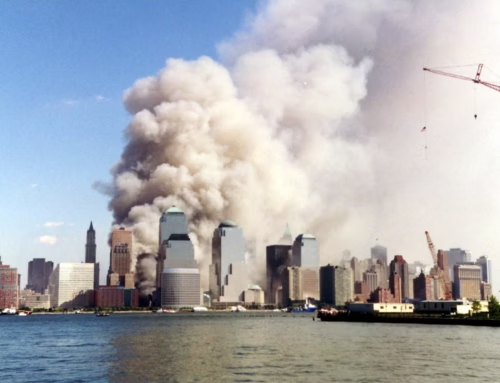Battle against Iran’s mullahs and UN anti-Semitism
Benjamin Netanyahu has been fighting Iran and the terror groups it funds, Hamas and Hezbollah, all his political life. But also against systemic anti-Semitism in the UN. Now his fight with Iran has become an open war while at the same time anti-Semitism within the UN system strikes back with full force against him personally.

Benjamin Netanyahu speaks at the UN on November 26, 1984. Photo: UN Photo/Saw Lwin.
Israeli Prime Minister Benjamin Netanyahu was born four years after the end of World War II. His mother, Tzila Segal, was born in Petah Tikva in the Ottoman Empire while his father Benzion Netanyahu was born in Warsaw. His father left Poland in 1920 and moved to what is today Israel, so escaping the Holocaust.
His son Benjamin grew up in West Jerusalem and on occasions in the United States, returning to Israel in 1967 for his military service. Between 1956 and 1958, and from 1963 to 1967, his family lived in the US where his father Benzion became a historian and taught college while his son Benjamin graduated from high school.
Benjamin Netanyhau served for five years in a military special force, conducting commando raids deep into Lebanese, Jordanian, Egyptian and Syrian territory. He was wounded several times before serving in the Yom Kippur War in 1973. In 1976, his older brother Jonathan Netanyahu was killed during the liberation operation at Entebbe airport in Uganda.
Ambassador to the United Nations
From 1984 to 1988 Benjamin Netanyahu served as Israel’s ambassador to the UN. In an interview with the Jewish-American magazine Moment in 1988, as UN ambassador he described how the UN had become an instrument of universal anti-Semitism and of political warfare against Israel. “There’s something new in the history of anti-Semitism.” he said. “During this century it moved to Germany and now it’s back in Russia. However, since the establishment of the UN, there’s something else, something new – because anti-Semitism now has a universal instrument, a universal apparatus for a global spread… In the UN, anti-Semitism has found a way to spread its toxicity through the bloodstream of nations,” said Netanyahu, who in 1996 became the youngest prime minister in the history of Israel and the first PM born in the State of Israel. Today he’s the country’s longest-serving prime minister.
Fought against Iran
The months leading up to his first election win in 1996 were marred by a series of terror attacks by Hamas, including suicide attacks on two buses in Jerusalem that killed 45 people and a suicide bombing in Tel Aviv that killed 13 and injured 130. Syria and Iran were suspected of helping with the planning and financing of these attacks.
After ascending to power, Netanyahu and Mayor Ehud Olmert of Jerusalem decided to open an exit in the Arab Quarter to make the tunnel along the Western Wall of the Temple accessible to tourists. The decision sparked three days of rioting by Palestinians, resulting in dozens of deaths.
Already in 1997 and 1999, Israeli police recommended for the first time that Netanyahu be tried for corruption but the charges were dropped due to lack of evidence.
Netanyahu was defeated in the 1999 elections and retired from politics. During the time that the Labor Party’s Ehud Barak was prime minister, the second intifada was launched in which the terror groups Hamas, Islamic Jihad and the PFLP carried out a series of extensive terrorist acts. Netanyahu soon returned to politics, becoming foreign minister and finance minister under Prime Minister Ariel Sharon, before resigning in protest at Sharon’s withdrawal from Gaza in 2005.
Party leader in Likud again
Netanyahu became the Likud party-leader the same year that Sharon, after be criticised for withdrawing from Gaza, left Likud and formed his own party. After the 2009 election, Netanyahu became prime minister for the second time. On September 24, 2009, in a speech to the United Nations General Assembly in New York, Netanyahu said that Iran posed a threat to world peace and that it was incumbent on the world body to prevent the Islamic Republic from acquiring nuclear weapons.
He then won elections in 2013 and 2015. Netanyahu has refused to accept restrictions on where Jews can live, arguing that Jerusalem’s Arabs and Jews should be able to buy homes wherever they want: “The idea that we should have this ethnic cleansing as a condition for peace, I think is anti-peace.”
Netanyahu has had fractious conflicts with political opponents. Many of them have previously cooperated with Netanyahu only to be fired or quit of their own accord. He has led a vigorous process towards a free market economy. The privatization of government agencies and the transformation of socialist Israel made him many political enemies.
In 2017 and 2019, Netanyahu was again indicted for corruption. In June 2021, Netanyahu lost the prime ministership, before returning after the 2022 election – which was the fifth democratic election in Israel in which about two million Arabs were eligible to vote, which is more democratic elections than in the entire rest of the Middle East during the same period.
Netanyahu’s coalition pushed through judicial reforms after the 2022 elections, which met with protests in early 2023. Allegations of corruption and criticism of his reforms were fueled by a political opposition that divided the country. Hezbollah’s leader Nasrallah said in the summer of 2023 that this political division was a sign of weakness.
Large-scale attack
In October 2023, Israel suffered a large-scale attack by the terrorist group Hamas, which started the war with Israel. Netanyahu was criticized for failing to anticipate the attack in what was described as Israel’s biggest intelligence failure in 50 years.
In the UN General Assembly in September of this year, Netanyahu pointed out that more resolutions against Israel have been passed in the UN General Assembly in the last decade than against the whole world combined.
“Since 2014, this body has condemned Israel 174 times. It condemned every other country in the world 73 times. That’s more than 100 additional condemnations of the Jewish state. What hypocrisy. What a double standard. What a joke. Until Israel, the Jewish state, is treated like other nations, until this anti-Semitic swamp is drained, the United Nations will be seen by righteous people everywhere as nothing more than a contemptible farce,” he said.
In October this year, 2024, Israel announced that UN Secretary-General Antonio Guterres was no longer welcome in Israel and that the UN aid agency UNWRA, due to its close association with the terrorist group Hamas, was also not welcome to work in Israel. In addition, the UN force UNIFIL – which was created to prevent Hezbollah from establishing itself near Israel’s northern border – have allowed Hezbollah to build launch pads and tunnels, as well as store a large number of missiles in the area, which according to the UN was to be demilitarized. On October 20 this year, a former Danish UN soldier told the Danish newspaper Berlingske Tidene that Hezbollah controlled the UN soldiers in South Lebanon.
– We were totally subordinate to Hezbollah. We had clearly limited freedom of movement. For example, we never operated after dark for fear of Hezbollah. So they were free to do as they liked after nightfall, said the soldier.



